On monia pahaenteisiä merkkejä, jotka osoittavat, että sinun on mentävä gastroenterologin puoleen, ja tästä viestistä opit, mitä oireita sinun tulee huomioida. Gastroenterologi on lääketieteen ammattilainen ja lääkäri, joka on käynyt läpi tiukan ja laajan koulutuksen oppiakseen hallitsemaan, hoitamaan ja parantamaan maha-suolikanavaan liittyviä lääketieteellisiä olosuhteita. Näitä alueita ovat suolisto, mahalaukku, maksa, ruokatorvi ja peräsuole.
Tällaisella nimikkeellä, joka edellyttää yli 5 vuoden koulutusta "sisätautien" ja "gastroenterologian" aloilla (valmistuneen lääketieteellisen korkeakoulun päätyttyä); GI-lääkärit tarjoavat poikkeuksellista hoitoa ja ovat yleensä lääkäreitä parempia ruoansulatuskanavan komplikaatioiden diagnosoinnissa ja hoidossa.
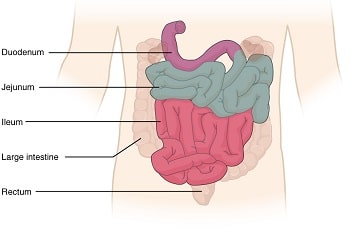
Sisällysluettelo
Gastroenterologit saavat erikoiskoulutusta "endoskopiassa", jossa käytetään pientä ja kapeaa, mutta joustavaa "putkea", jossa on sisäänrakennettu kamera ja jota käytetään navigoimaan ruoansulatuskanavassa toimenpiteiden, leikkausten tai diagnostisten testien aikana. sairauksia tai kasvaimia.
Kun on kyse ruoansulatuskanavaan liittyvistä lääketieteellisistä ongelmista, hoidon hakeminen gastroenterologilta varmistaa, että saat tehokkaimman mahdollisen hoidon koska saat hoitoa lääketieteen ammattilaiselta, jolla on ainutlaatuinen ja syvällinen koulutuskokemus, joka tarkoittaa, että saat sekä korkealaatuista että "kattavaa" hoitoa mahdollisiin GI:hen liittyviin lääketieteellisiin komplikaatioihin, joita saatat kohdata.
Tutkimusten avulla on tilastollisesti todistettu, että gastroenterologit suorittavat kolonoskopiaa ja kattavaa maha-suolikanavan ongelmien hoitoa suuremmalla onnistumisprosentilla verrattuna muuntyyppisten lääkäreiden tarjoamiin hoitoihin. Tämä tarkoittaa sinulle sitä, että saat hoidon, joka havaitsee tarkasti syövän tai polyyppien esiintymisen ja vähentää samalla hoidosta johtuvien lääketieteellisten komplikaatioiden mahdollisuutta (GI-hoitoa saaneet potilaat voivat myös odottaa viettävän vähemmän aikaa sairaalaan).
Tässä kirjoituksessa käsittelemme "15 tärkeintä varoitusmerkkiä, joista sinun on mentävä gastroenterologin puoleen", mikä auttaa sinua määrittämään, onko sinulla sellaisia lääketieteellisen komplikaatioiden oireita, jotka vaatisivat GI-lääkärin huomiota ja hoitoa. lääkäri.
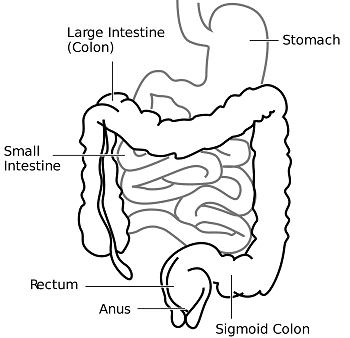
Kun alat tunnistaa äskettäin muodostuneita "kipuja" tai muita ruoansulatuskanavan alueelta peräisin olevia merkkejä/oireita, kuten närästystä, vatsakipua, ripulia tai ummetusta, saatat kysyä itseltäsi, pitäisikö sinun käydä tavallisen lääkärin luona vai ei. sisätautilääkäri tai gastroenterologi (ruoansulatuselimistön erikoislääkäri). Kenen päätät diagnosoida sairautesi niiden ilmaantumisen alussa, voi vaihdella useista tekijöistä.
Joissakin tilanteissa oikean valinnan tekeminen lääkärin tai gastroenterologin puoleen voi jäädä epäselväksi, mutta alla autamme sinua ymmärtämään oireita, jotta voit kiinnittää huomiota maha-suolikanavan ongelmiin, jotka tulisi diagnosoida ja hoitaa GI-lääkärin toimesta.
Jos sinulla on juuri nyt oireita tai kipuja ruoansulatuskanavassa ensimmäistä kertaa, ensimmäinen askel voi olla hakea neuvoa ensisijaiselta lääkäriltä, kuten perusterveydenhuollon lääkäriltä tai sisätautilääkäriltä.
Tämä on toivottavasti lääkäri, jonka kanssa olet rakentanut suhteen ajan myötä, koska hänellä olisi täydellinen pääsy lääketieteelliseen ja hoitohistoriaasi, jota voidaan tarkastella uudelleen ja selvittää, mikä aiheuttaa kokemasi oireet.
Kun tapaat lääkärisi ja annat hänelle oireesi, suoritetaan fyysinen koe, jotta päätetään, mitä testejä pitäisi tehdä vai ei. Kun lääkäri on suorittanut fyysisen kokeen ja hänellä on hyvä käsitys siitä, mikä aiheuttaa sinulle äkilliset maha-suolikanavan kivut, hän voi päättää, että hoidon on annettava asiantuntijalta, joka voi tarjota affektiivista toipumishoitoa. Tässä tapauksessa "asiantuntija" olisi gastroenterologi.
Tri Tarugu, kokenut ja palkittu gastroenterologi Etelä-Floridasta suosittelee, että henkilöt, joilla on jatkuvasti joko satunnaisia tai toistuvia pahenemisvaiheita aiemmin diagnosoiduissa sairauksissa (kuten haavainen paksusuolitulehdus, Crohnin tauti tai IBS), hakeutuvat välittömästi gastroenterologiin hoitoon lisäkasvun tai komplikaatioiden välttämiseksi. vahva> maturiteetti.
Gastroenterologin hoidon aikana hän päivittää lääkärillesi sairautesi tilasta ja edistymisestä. Nämä päivitykset auttavat perusterveydenhuollon lääkäriäsi ymmärtämään statustasi, mikä auttaa lääkäriä tarjoamaan sinulle asianmukaista hoitoa toipumisen jälkeisenä tukena. Pari muuta maha-suolikanavan sairautta, joita GI-lääkärit hoitavat, ovat sairauksia, jotka sijaitsevat haiman alueella tai maksassa.
Jos perusterveydenhuollon lääkärisi epäilee, että näillä alueilla ilmenee ongelmia, on turvallista olettaa, että sinut lähetetään paikalliselle gastroenterologille perusteellista diagnoosia varten, jolloin voidaan laatia hoitosuunnitelma.
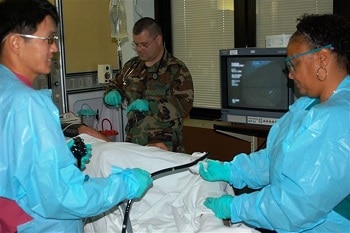
Jokainen niistä on ainutlaatuisia merkkejä mahdollisesti vakavista tiloista, joita ei pidä hylätä "ei-tärkeänä", koska jokainen yllä luetelluista oireista voi johtaa paljon pahempiin komplikaatiosignaaleihin, jos niitä ei diagnosoida ja hoitaa "varhaisessa vaiheessa".
Alla kerromme, mitä kukin näistä oireista voi tarkoittaa ja miksi on tärkeää hakea GI-lääkärin opastusta ja hoitoa mahdollisimman nopeasti.
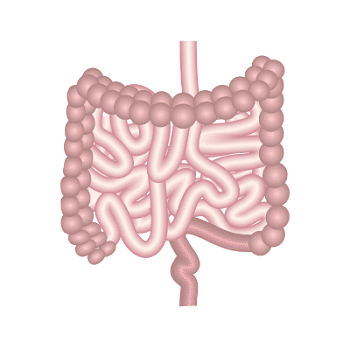
On arvioitu, että yhteensä 60 miljoonaa ihmistä Yhdysvalloissa kokee ja kärsii närästystä keskimäärin vähintään kerran kuukaudessa, ja arviolta 15 miljoonaa ihmistä kärsii tästä tilasta "päivittäin". Happaman ruoansulatushäiriön (närästyksen) oireet ovat tyypillisimpiä raskaana oleville naisille ja vanhuksille.
On olemassa tila nimeltä "Gastroesofageaalinen refluksi", joka on kehon tila, joka saa mahahapon virtaamaan taaksepäin ja palaamaan ruokatorveen. Tästä johtuen jotkut ihmiset valitettavasti kokevat tästä johtuvia oireita tämän prosessin aikana (joka voi olla päivittäin, viikoittain tai kuukausittain).
Yksi ensimmäisistä merkkejä gastroenterologin käynnistä närästyksen vuoksi on kokemus kuumennetun epämukavuuden tuntemisesta, joka tulee rintarangan takaa. Tällä tunteella on taipumus siirtyä kurkun ja kaulan alueelle, joten kaikenlainen epämukavuus tällä alueella pitäisi olla varoitusmerkki että sinun on otettava yhteys gastroenterologiin diagnoosia/hoitoa varten.
Toinen varoitusmerkki happorefluksista on "hapan" tai "katvas" maku kurkussa, koska tämä on mahahapon makua. Koska närästyksen kuumentuneet paineoireet voivat kestää jopa useita tunteja (ja pahenevat syömisen yhteydessä), tämän alueen jatkuvan kiihtymisen pitäisi saada sinut hakeutumaan välittömästi diagnostiseen tutkimukseen GI-lääkäriltä.
Jos koet tällaisia oireita vähintään 2 kertaa viikossa tai koet painonlaskua, verenhukkaa tai ruoan tarttumista, sinulla voi olla närästys, joka on erittäin vakava. Jos tällaisia oireita ilmaantuu, sinulla saattaa olla sairaus, joka tunnetaan nimellä "Gastroesofageaalinen refluksitauti (tai "Gastroesofageaalinen refluksitauti").
Ennen kuin voit alkaa ymmärtää GERD:n tai gastroesofageaalisen refluksitaudin tarkat syyt, sinun on ensin ymmärrettävä närästyksen syyt. Suurin osa ihmisistä tuntee närästyksen levottomuutta, jos ruokatorven limakalvo joutuu kosketuksiin mahanesteiden kanssa pitkän ajan .
Nämä mahanesteet koostuvat muutamista eri materiaaleista, mukaan lukien ruoansulatukseen liittyvistä entsyymeistä ja haposta. Kun mahahappo pysyy kosketuksissa ruokatorven limakalvon kanssa, ruokatorveen voi aiheutua vaurioita, jotka johtavat epämukavaan, polttavaan ja kivuliaan tunteeseen.
Vaikka lihaksikas venttiili ruokatorven pohjaa kohti (tunnetaan nimellä "alemman ruokatorven sulkijalihaksena" tai "LES") pitää hapon mahassa ja poissa ruokatorvesta (kun se toimii oikein), näin ei ole, jos henkilöllä on joko "gastroesofageaalinen refluksitauti" tai "GERD", koska "LES":llä on taipumus rentoutua säännöllisesti, mikä mahdollistaa mahahapon palautumisen ruokatorveen.
GI-lääkärin tulee hoitaa tällainen oire mahdollisimman pian lisäkomplikaatioiden kehittymisen estämiseksi.
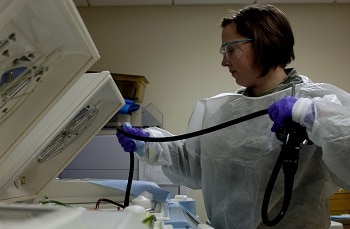
Kun vierailet GI-lääkärilläsi, laaditaan hoito-/palautussuunnitelma diagnostisten tulosten perusteella.
Jos huomaat itselääkittäväsi närästystä useammin kuin kahdesti viikossa, tämä yksinään on merkki gastroenterologin hoidon tarpeesta. Sairaudet, jotka jäävät hoitamatta kokeneen GI:n toimesta, voivat mahdollisesti johtaa vakavampiin komplikaatioihin.
Onko sinulla ongelmia ruoan nielemisen kanssa? Onko sinulla vaikeuksia nesteiden poistamisessa? Onko sinulla satunnaista tai jatkuvaa turvotusta kurkun alueella? Jos näin on, tämä saattaa olla varoitusmerkki vähäisestä tai vakavasta sairaudesta, jonka pitäisi saada sinut hakeutumaan gastroenterologille diagnoosia varten. "Kaikenlainen juomaveden aiheuttama kipu tai levottomuus voi olla varoitusmerkki vakavasta maha-suolikanavan ongelmasta", totesi kokenut, hallituksen sertifioitu ja palkittu gastroenterologi tohtori Vikram Tarugu.
Muita varoitusmerkkejä, jotka gastroenterologin tulee tietää, liittyykö nielemisvaikeuksiisi hikkausta, kurkun käheyttä, toistuvaa yskää tai kylläisyyden tunnetta sen jälkeen, kun olet syönyt hyvin pienen annoksen ruokaa. Jos jokin näistä mahdollisesti vaarallisista varoitusmerkeistä ilmenee, syy voi mahdollisesti olla ruokatorven syöpä. Jos näet jonkin näistä varoitusmerkeistä, älä epäröi hakea neuvoa päälääkäriltäsi tai gastroenterologilta, jos sinulla on jo suhde johonkin. Haiseeko kaasusta epätavallinen haju? Tämä voisi olla varoitusmerkki tarttuvista loisista
Yllättävää kyllä, tyypillinen ihminen erittää keskimäärin lähes 2 litraa kaasua päivittäin, ellei ruoansulatuskanavassa tapahdu poikkeavuuksia. Yksi varoitusmerkki, johon on kiinnitettävä erityistä huomiota, on, jos tunnet kipua tai epämukavuutta vatsan alueella kaasujen erittymisen tai ulostamisen aikana.
Lisäksi, jos suolen liikkeet ja kaasut ovat alkaneet haistaa epätavallisen hirveästi, tämä voi olla merkki siitä, että sinulla on giardia, joka on loinen, joka ärsyttää ja saastuttaa suolistoa. Koska giardia voi pahentua, jos sitä ei hoideta, tällaista varoitusmerkkiä ei pidä jättää huomiotta.
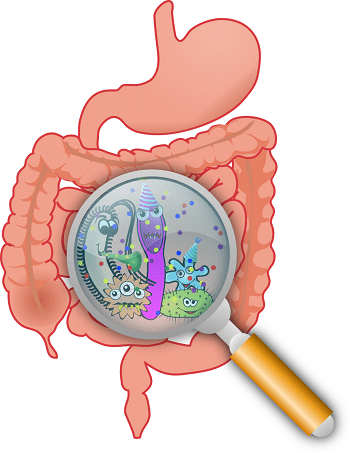
Olemme kaikki kokeneet turvotusta jossain vaiheessa elämäämme, mutta jos se jatkuu, on olemassa mahdollisuus, että taustalla on jokin syy. Jos olet huomannut, että sinulla on ollut vaikeuksia saada shortsit jalkaan, kun vain muutama päivä sitten käytit niitä ilman ongelmia, ei ehkä syynä ole se, että "hyväksyit pois kuntosalilta".
Turvotusta tapahtuu yksinkertaisesti, kun saamme ruokaa/ilmaa liikaa eikä kehomme pääse siitä kunnolla eroon. Jos turvotus kuitenkin alkaa äkillisesti ilman näkyvää syytä (et ole syönyt vähään aikaan) ja esiintyy samanaikaisesti kipua tai verta ulosteessa, tämä voi olla varoitusmerkki siitä, että on aika hakeutua gastroenterologille.
Tällainen merkki voi mahdollisesti tarkoittaa, että keliakian, GERD:n (Gastroesophageal refluksitaudin), IBS:n (ärtyvän suolen oireyhtymän) ummetuksen tai sappikivien kehittyminen on alkanut.
Joka tapauksessa, jos tunnistat verta ulosteessa tai epätavallisia teräviä kipuja vatsan alueella kaasuttamisen tai ulostamisen aikana, sinun on ehdottomasti saatava GI-lääkärin diagnoosi ja hoito.
Yksi varoitusmerkki, jonka GI-lääkärin tulisi diagnosoida, on äkillinen, odottamaton ja selittämätön painonpudotus. Vaikka äkillinen painonpudotus voi johtua useista muista terveyteen liittyvistä ongelmista, tyypillisesti paras paikka etsiä ongelman juurta on ruoansulatusjärjestelmä.
Tohtori Tarugu, Etelä-Floridassa toimiva gastroenterologi, jolla on yli 2 100 onnistuneesti suoritettua toimenpidettä, sanoi, että "ensimmäiset ongelmat, jotka haluat eristää äkillisen painonpudotuksen syynä, ovat maha-, haima- tai paksusuolensyöpä".
Jos paino putoaa äkillisesti, käänny gastroenterologin puoleen, jotta voit olla varma, ettei kyseessä ole syöpä tai Chronin/keliakia (joka heikentäisi kehosi kykyä imeä tärkeitä ravintoaineita).
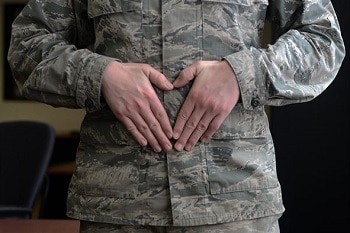
Suolen liikkeen aikana olisi luultavasti hieman huolestuttavaa havaita punaisia jälkiä wc-paperilla, koska me kaikki tiedämme, että verenvuoto sellaiselta alueelta ei ole normaalia. Verenvuoto peräsuolen alueelta voi olla merkki mahdollisesti vaarallisesta tilasta, ja se tulee diagnosoida ja hoitaa "välittömästi".
Vaikka on mahdollista, että verenvuoto johtuu peräpukamista, jos näin ei ole, gastroenterologin hakeminen on ehdottomasti välttämätöntä, varsinkin jos verenvuoto toistuu ja henkilö on yli 40-vuotias.
Ruoansulatushäiriöt (jota kutsutaan myös lääketieteellisesti "dyspepsiaksi") on termi kuvaamaan tilaa, johon liittyy useita erilaisia oireita, jotka ilmaantuvat aterian aikana. Joihinkin näistä oireista voi kuulua "täytetyn" tunne aterian päätyttyä sekä "kipu" tai "polttava tunne" ylävatsan alueella.
Ruoansulatushäiriöt ovat melko yleisiä keski-ikäisillä aikuisilla, ja niitä esiintyy kuukausittain, viikoittain tai jopa päivittäin.
Jos sinulla on jokin seuraavista oireista, neuvonnan ja hoidon hakeminen GI-lääkäriltä on välttämätöntä komplikaatioiden ehkäisyssä:
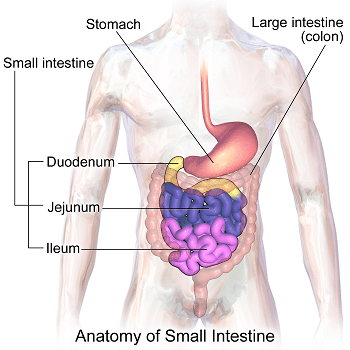
When visiting your GI doctor a treatment/recovery plan will be formulated based upon the diagnostic results.
Possible treatment suggestions may include:
Keep in mind that indigestion and heartburn are two different conditions with each having their own unique symptoms.
However, if you’re experiencing the symptoms of both then it’s possible that you’re suffering from both of the two. Regardless, whether the agitation is minor or severe it’s important that you take such a warning signal seriously and seek treatment from a GI doctor that will help to diagnose and remedy the condition(s).
Nausea is quite an unpleasant experience and can use intense feeling of dizziness, minor to severe discomfort and paint in the abdominal area. On the other hand, often times accompanies by nausea, vomiting is the occurrence of a contraction from the stomach that during times of nausea can help one feel a bit better as the content of stomach is during vomiting is the process in which it’s propelled up thru the esophagus.
Intense and consistent vomiting could possibly be a warning sign of a Gastroenteritis which can be treated by a gastroenterologist. Gastroenteritis is known to be a viral infection that causes inflammation within the digestive tract and can be treated thru the use of medication(s) which will be recommended by the gastroenterologist that you choose to visit.
Are you experiencing a dullish pain in the stomach, weight loss, the undesired to intake food due to pain or nausea/vomiting? If so, this could be a sign of a minor yet serious matter. Such warning signs could possibly mean that you’re suffering from a Peptic Ulcer which can be diagnosed by a gastroenterologist thru the use of an upper GI series or an endoscopy.
If you’re experiencing upper abdominal pains (one of the biggest signs of a stomach ulcer ) be sure that you seek the diagnosis/treatment from a GI doctor so you can have it treated while preventing the possibly of further complications arising from the condition.
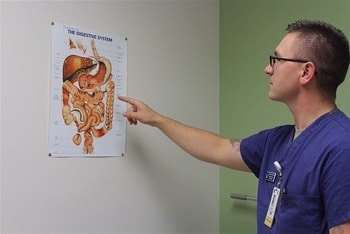
Individuals that may have GI disorders can suffer from warnings signs that are both painless and pain-induced. Such symptoms can be diarrhea/constipation (in some cases, irritable bowel syndrome). Such signs, whether they’re painful or not, could possibly be a sign of a condition other then IBS known as “centrally mediated abdominal pain syndrome” (or “CAPS” for short) which used to be medically referred to as “functional abdominal pain syndrome” (FAPS).
CAPS is a gastrointestinal disorder and is typically caused by a change in the nerve impulse sensitivity and will cause intense and frequent pain in the abdominal section which for some individuals will be quite severe.
In some cases, pain can be so intense and persistent that it’ll affect you in the similar way as the pain from a tooth ache as it can consume your focus/life since it has a tendency to “not go away” for extended periods of time. If such warning signs are present, seek counsel from a gastroenterologist where an antidepressant may be prescribed to not only reduce anxiety caused by the pain but to help alleviate the pain all together.
If you’re experiencing the feelings of belching, bloating or flatulence (build-up of gas in the alimentary canal), these could be warning signs that you you could possibly be suffering from a number of different conditions including allergies to certain foods, lactase deficiency, peptic ulcer disease or a H. Pylori Infection. Each of these we’ll cover below more in-depth so you can determine the possible cause(s) of your symptom(s).
Food Allergies – While not typical, the most severe allergic reaction that one can inherit from the ingestion of food is known as “anaphylaxis” which could possibly be life-threatening. Studies have shown that 90% of all allergies related to foods are caused from the ingestion of soy, wheat, shellfish, tree nuts, fish, peanuts, milk and eggs. If pain tends to arise after consuming such food items then this may be a signal that you need to seek the treatment of a gastroenterologist.
Lactase Deficiency – While lactase deficiency is pretty common with an estimated 3 million cases per year alone within the US, it’s an issue that’s brought upon individuals whose body has difficulty with digesting the sugar contents within dairy products. These issues arise in the digestive tract and can be treated by a GI doctor thru the use of recommended off-the-shelf medication(s) or by a prescribed medication (depending on the severity of your condition.

Individuals suffering from “Lactase Deficiency” can expect such warning signs to arise within 30 minutes to 2 hours from the consumption of milk or other food items containing dairy.
While symptoms aren’t always noticeable there are some warning signs that if arise should prompt you to see a gastroenterologist.
If you experience persistent and severe abdominal pain, have difficulty with swallowing or have bloody/black vomit that has the appearance of coffee grounds then seek diagnosis from a GI doctor for treatment as these are all warning signs that need attention before complications arise.
If you experience a yellowing of the eyes/skin then it’s very well possible that this is the warning sign that Jaundice is occurring. Jaundice is a condition in which there’s an excessive amount of bilirubin in the blood which is known, medically, as hyperbilirubinemia.
Bilirubin is a “yellow pigment” substance that affects the color pigmentation in the white of your eyes and your skin tone.
If you’re experiencing such signs of this condition schedule an appointment to see a GI doctor as quickly as possible as if not, further complications could develop which could lead to:
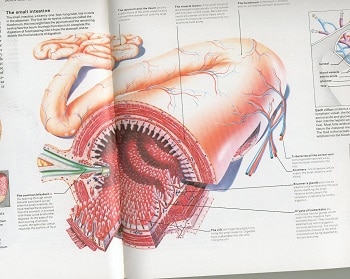
One warning signing of a possibly serious complication that should be diagnosed immediately is pain experienced in the abdominal section with the occurring pain spreading/radiating to your back. Such a feeling is a strong indicator and warning sign of “gallstone pancreatitis ”.
Gallstones are a pretty common cause of pancreatitis and this is caused by gallstones that develop in the gallbladder to block the bile duct which puts a stop to the pancreatic enzymes from being able to travel to your small intestine (which forces them to return to the pancreas).
During this process, these pancreatic enzymes will agitate the pancreas cells which will cause inflammation which can cause a great deal of pain that will radiate from the abdomen to the back. In some cases, this feeling of pain will also be accompanied by a tingling, prickly sensation. If such warning signs arise, seek attention from a physician or preferably a gastroenterologist who will help to diagnose the issue so proper treatment can be prepared/prescribed.
In the event that the gastroenterologist determines that your pancreatitis us due to the gallstones then an ECRP (Endoscopic Retrograde Cholangiopancreatography) will be performed which is a procedure conducted by the GI doctor to remove the stones.
For heavier/obese women it’s important to take cautious note of any pain that stems from the upper right-hand side of the abdominal sections as such a pain could be the indicator of “gallstone pancreatitis” (a prominent condition for heavier-set women). What’s causing such pain is the process of the gallstones blocking the bile duct which causes a chain reaction as this will stop any/all pancreatic enzymes from traveling to the small intestine providing the enzymes with no choice but to return to the pancreas. If the gallstones travel from the gallbladder to the common bile duct, gallstone pancreatitis can develop which is a condition that can continue to worsen and mature in pain while also leading to further complications if not treated.
If you’re medically considered to be “obese” and have had such pain on a regular or consistent basis, consult a GI doctor as treatment in the form of medication and surgeries are available (depending on the severity of the condition). Only making 1-2 bowel movements per week? Difficulty with going? Pain during defecating?
There are a few signs to look out for and notate when looking for signs of possible gastrointestinal complications. A few of these signs include difficulties with making bowel movements, only making 1-2 bowel movements per week or if you experience pain during defecating. Constipation is considered to be present whenever an individual is making only 1-2 bowel movements per week so if this persists this alone could be a warning sign of “anal fissure”. With an estimated 200,000 cases per year within the US alone, anal fissure is a condition that refers to the tearing in the lining of the anus which can cause an immense amount of pain during all three scenarios we referred above (making bowel movements and pain during throwing-up).
Anal fissures develop throughout the specialized tissues that line both the anus and anal canal and this is called the “anoderm”. The reason this can be (and more than likely “will be”) so painful is because of the over-abundance of nerves located within the anal canal. Diagnosis and treatment from a gastroenterologist is recommended. Typically, diagnosis of this condition can be determined by the physical inspection of area with either medication or surgery being recommended to treat (depending on the severity of the anal fissure).
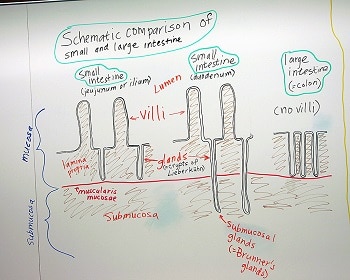
If you’re experiencing symptoms of a condition that includes intense and regular fevers, nausea/vomiting and diarrhea then notate these warning signs to show a gastroenterologist as these are signs of a possibly serious condition known as “bacterial gastroenteritis” which will need to be treated to prevent complications that could arise.
Bacterial gastroenteritis is a condition that develops and occurs whenever bacteria infiltrates your gut can and initiates an infection. If this occurs, inflammation will develop both in your stomach and intestines which will cause discomfort to say the least. Typical symptoms of “bacterial gastroenteritis” includes severe, extreme and persistent cramps in the abdominal area in addition to diarrhea/
While viruses are responsible for the majority of gastrointestinal infections bacterial infections are nearly just as common. A majority of people refer to bacteria-initiated infections as “food poisoning”.
There are a few different causes of “bacterial gastroenteritis” which can be poor hygiene habits, coming in close contact with pets or animals or from consuming foods/fluids that are contaminated with bacteria (even air-borne bacteria). If such warning signs arise, seek medical attention from a physician or preferably a gastroenterologist so the issue(s) can be properly treated to above any further development of bacterial growth.
First and foremost, any sign(s) of rectal bleeding is “not normal” and should never, in any scenario, be dismissed as a minor or non-severe matter as it’s a serious occurrence that requires the attention and treatment from a gastroenterologist.
One of the most prominent signs and symptoms of “irritable bowel syndrome” (IBS) is rectal bleeding and the presence of blood in the stool. In some circumstances, a warning sign is not making a bowel movement at all or only 1-2 times per week.
Blood expressed from the body caused IBD will appear to be “bright red” while if blood is originating from the upper area of the digestive tract the blood will be darker (dark/black stools). If such a sign has arisen be sure that you notate the darkness of the blood so you can provide this detail to a gastroenterologist who will use this information as a part of the diagnosis and treatment(s). In any case, if bleeding from the rectum is “severe” or if you’re throwing-up blood than this is a sign of a severe condition occurring which needs medical attention “immediately”.
Furthermore, such signs could also be a warning sign that you’re suffering from either “Crohn’s disease” or “ulcerative colitis” which are also conditions that you’ll want to have inspected by a GI doctor. Chron’s disease is a condition affecting 200,000 individuals per year and is a chronic, inflammatory irritable bowel disease that runs alone the digestive tract lining.
Ulcerative colitis is another chronic disease that inflames the bowel area which results in the digestive tract becoming inflamed. If any of the warning signs above are occurring, seek medical attention. You don’t want to take the chance of such conditions maturing in growth/size as not only could further complications arise but you may have to undergo additional treatments which otherwise could’ve been avoided had you have the condition(s) treated early on.
Experience vague or minor abdominal pain with a change in bowel movements last for 3+ months? Any changes in your normal bowel movement habits that are lasting for 3+ months is a sign that your body is changing, or, is changing due to an irregular occurrence/condition that should be looked at by a GI doctor; especially when you’re experiencing changes in bowel movement that are lasting for an extended period of time.
Irritable Bowel Syndrome (IBS) is a condition that can spark a significant amount of pain to its victims and will initiate a discomforting agitation feeling in the abdominal area. There are some very common symptoms of having IBS which include constipation, gas and diarrhea (in addition to a pain-induced belly). Having your IBS diagnosed for the severity will help you to have a planned pain-management regiment that will be created for you by the gastroenterologist.
When your stomach is experiencing pain it’s caused from the constipation or the diarrhea although is the painful feeling(s) diminish upon making a bowel movements then more than likely, your symptom(s) are an indicator of your pain being tied to a condition other than IBS (consult a GI doctor for diagnosis). This pain is initiated by contractions which can and will cause intolerable pain that will consume your life, make it difficult to rest and will make it difficult to focus on aspects of life (work for example).
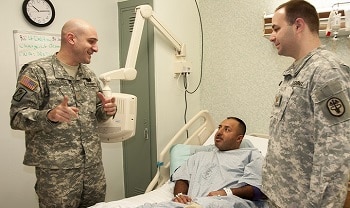
When it comes to your health it’s never a smart idea to over-look symptoms of possible health-related complications and rectal pain, bleeding from the rectum or the presence of blood in your stool are warning signs of a possibly serious complication. If you’re experiencing any of these signs, there’s a possibility that you body is suffering from one or more conditions that include it hemorrhoids, anal fissure, or anorectal cancer (although this is rare).
Hemorrhoids is a condition that should be treated by a GI doctor as Hemorrhoids is a medical condition that means the veins in the rectum and anus have become “swollen” which can cause the veins to bulge which will then result in severe agitation especially during bowel movements. Swollen hemorrhoids may be referred to by your gastroenterologist as “piles” as this is a commonly used medical term for this particular condition.
Hemorrhoids , depending on the severity of you case(if it’s determined by the GI doctor that you in-fact have it), you may undergo an operational procedure where the gastroenterologist will make use of specially designed medical equipment (not that intrusive) to “shrink” and “remove” the hemorrhoids which could actually be done on-site at the GI doctor’s office. Another treatment option is the GI doctor administering an injection in to the hemorrhoid with a specially formulated solution that will result in scarring the hemorrhoid to close it off.
Anal fissure is another condition that could be occurring if bleeding from the rectum is prevalent as this condition is the occurrence of “tearing” in the anus lining which will cause blood to originate out of the rectum which can be noticeable by looking at the stool (is blood noticeable?).
Finally, bleeding from the rectum can “possibly” be a sign of “anorectal cancer ” although this is quite uncommon and not the typical cause of bleeding from the rectal region. “Anorectal cancer” is a malignant infested disease that forms within the tissues and glands of the anus. If you’re suffering with HPV (human papillomaviurs) will increase the chances of “rectum cancer development” so it’s vitally important that you seek diagnosis is warning signs such as rectal bleeding occur.
For elderly/older women, experiencing a bulge or in the rectal area (comparable to a stomach bulge) is a serious sign of either “rectal prolapse” or “vaginal prolapse”; serious yet treatable conditions that can be cured by a gastroenterologist thru the practice of medication(s) or procedural operations.
In the United States it’s estimated that 10% of all elderly women suffer from rectal prolapse with signs ranging from rectal bleeding to the feeling of a “bulge” in the rectal region (noticeable to the touch). Rectal prolapse, specifically, is a condition in which the parts of the large intestine will protrude out of the anus and will cause quite a bit of discomfort, pain, difficulty with making a bowel movement and rectal bleeding.
If such signs occer, don’t procrasitance on receiving treatment. Consult with a GI doctors so treatment preparation(s) can be facilitated.
Vaginal prolapse is another condition that rectal bleeding can be a warning sign of. Vaginal prolapse is a serious condition where the bladder, rectum, urethra, small bowel or uterus will begin to fall out place.
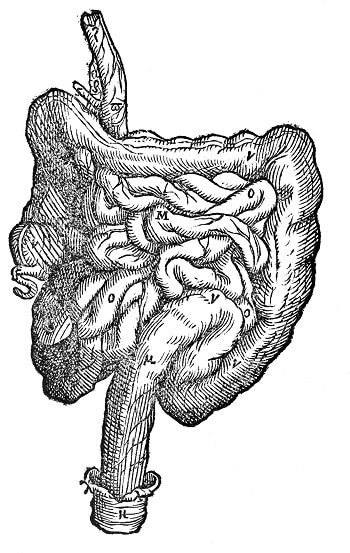
If any of these warning signs occur, it’s time to visit a gastroenterologist so you can receive an accurate diagnosis and treatment.
When it comes to your overall health, maintaining your normal body functions and avoiding complications a gastroenterologist can is a great go-to medical professional as you’ll be able to take advantage of the specialized training that the GI doctors has received so you can alleviate yourself of medical complications.
If any of this signs on this list has occurred, don’t hesitate to seek the intervention of a GI doctor. It’s paramount to ensuring the longevity of your health and will provide you with the peace-of-mind knowing that your symptoms are being affectively diagnosed and of course, treated.
We hope you found this guide helpful. Your gastrointestinal health is important to us and it’s our sincere mission to provide useful medical advice and suggestions.
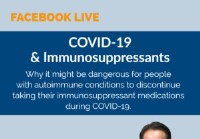 Facebook Live:COVID-19 ja immunosuppressantit
COVID-19 ja immuunivastetta heikentävät lääkkeet:miksi autoimmuunisairauksista kärsivien ihmisten voi olla vaarallista lopettaa lääkkeiden käyttö Liity meihin keskiviikkona 22.4.20 klo 12.00 CST
Facebook Live:COVID-19 ja immunosuppressantit
COVID-19 ja immuunivastetta heikentävät lääkkeet:miksi autoimmuunisairauksista kärsivien ihmisten voi olla vaarallista lopettaa lääkkeiden käyttö Liity meihin keskiviikkona 22.4.20 klo 12.00 CST
 5 vinkkiä paksusuolen terveydelle
Terve kaksoispiste ei usein ole tärkein uudenvuodenlupaus – mutta sen pitäisi olla . Paksusuolisyöpä on sekä parannettavissa että hyvin ehkäistävissä. Kolonoskopian varhaisen havaitsemisen avulla voit
5 vinkkiä paksusuolen terveydelle
Terve kaksoispiste ei usein ole tärkein uudenvuodenlupaus – mutta sen pitäisi olla . Paksusuolisyöpä on sekä parannettavissa että hyvin ehkäistävissä. Kolonoskopian varhaisen havaitsemisen avulla voit
 Ovatko naiset todennäköisemmin kehittyneet pitkään COVIDiin?
Tutkijat havaitsivat, että erilaiset oireryhmät jatkuvat koronaviruksen 2019 (COVID-19) jälkeen, väsymys ja korkeampi IL-6-taso naisilla. Noin 75% hoidetuista potilaista oli naisia, osoittaa sukupuoli
Ovatko naiset todennäköisemmin kehittyneet pitkään COVIDiin?
Tutkijat havaitsivat, että erilaiset oireryhmät jatkuvat koronaviruksen 2019 (COVID-19) jälkeen, väsymys ja korkeampi IL-6-taso naisilla. Noin 75% hoidetuista potilaista oli naisia, osoittaa sukupuoli